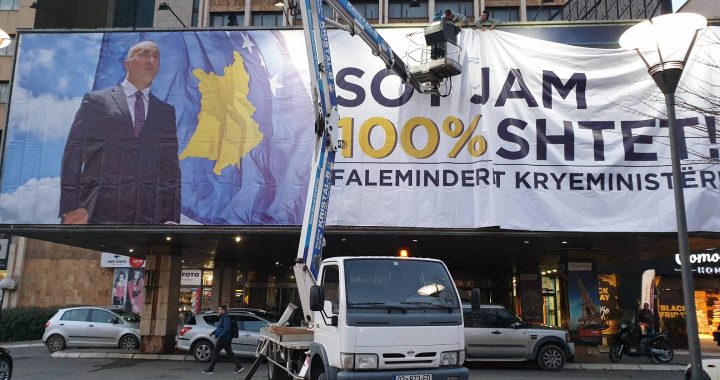

 A poster of Kosovo PM Ramush Haradinaj in front of the Grand Hotel, days after Kosovo imposed a 100 per cent tax on Serbia and Bosnia and Herzegovina. | Photo: Kallxo.com.
A poster of Kosovo PM Ramush Haradinaj in front of the Grand Hotel, days after Kosovo imposed a 100 per cent tax on Serbia and Bosnia and Herzegovina. | Photo: Kallxo.com.
In the year since the Kosovo Government imposed a 100 per cent customs tariff on goods from Serbia and Bosnia and Herzegovina, imports have dropped, food prices have risen, and the dialogue between Kosovo and Serbia has been suspended.
Thursday marks a year since the Kosovo Government enforced a 100 per cent customs tariff on all goods originating from Serbia and Bosnia and Herzegovina.
The tariff was put in place by former Prime Minister Ramush Haradinaj in November 2018, in response to what the outgoing government described as Serbia and Bosnia and Herzegovina’s “destructive role” in the delegitimization of Kosovo’s sovereignty, including campaigning against Kosovo’s bid for membership in key international organizations such as Interpol.
365 days later, the decision has had tangible consequences on the ground, both politically and economically. Most notably, it has put relations between Kosovo and Serbia under significant strain, bringing the EU-mediated dialogue between the two countries to an impasse.
Artan Demhasaj, the executive director of Cohu, an anti-corruption and good governance NGO, believes that the tariff was always a political rather than economic step. “In the beginning, the tariff was not implemented with economic intentions, but for political reasons, with Serbia continuing its obstructionist politics concerning Kosovo on the international scene, be it through de-recognitions or membership in different international organizations,” he told BIRN.
However, the tariff has had a dramatic impact on the volume of exports from the two countries to Kosovo.
The General Director of Kosovo Customs, Bahri Berisha, told Radio Free Europe that over the last year, both Serbia and Bosnia and Herzegovina have exported only six million euros worth of goods to Kosovo in total. This figure is down nearly 99 per cent from the period between November 2017 and November 2018, when, according to Berisha, Serbia exported 450 million euros worth of goods to Kosovo, while Bosnia and Herzegovina exported 85 million euros worth of goods.
The tariff has effectively created a blockade on Serbian goods, but according to a report published by the GAP Institute covering the five month period following the imposition of the tariff, Kosovo’s economy has not reaped much reward. The price of necessities and items for daily consumption increased, while Serbian products were largely replaced by goods coming from Turkey, Israel and Slovenia.
A 2019 World Bank report specifically mentioned the tariff in regards to an increase in food prices. “Kosovo experienced the highest inflation in the region in 2018, driven by a rise in food price inflation which rose steadily since July and reached 5.5 per cent in December — the 100 per cent tariff increase introduced on imported goods from Serbia and Bosnia and Herzegovina may have contributed to the acceleration of inflation at the end of the year.”
Over the past year, Kosovo law enforcement authorities have struggled to control the illegal entry of goods from Serbia. BIRN has reported on the smuggling activities rife in northern Kosovo during this period, where goods from Serbia enter into Kosovo’s territory illegally.
The 100 per cent tariff has had political effects in the north of the country as well. A week after the tariff increase was imposed, the mayors of Leposavic, Zubin Potok, North Mitrovica and Zvecan handed in their resignation prior to a protest by Kosovo Serbs opposing the tariff on Serbian products. In May, the same mayors were re-elected in a landslide victory for the Belgrade-backed party, Lista Srpska.
Meanwhile, Belgrade has conditioned the continuation of the EU-mediated dialogue between Serbia and Kosovo with the discontinuation of the tariff. But for Demhasaj, the suspension of the dialogue had one advantage, halting talks over exchange of territories between the two states.
“We saw that exponents within the international community gave signs of support to the idea of [border] corrections, including France and Austria,” Demhasaj said. “The tariff has helped halt this initiative.”
Albin Kurti, the leader of Vetevendosje who is expected to take the position of prime minister in the upcoming government, told the Guardian that the tariff would only be lifted if there are full reciprocal measures freeing Kosovo’s trade into Serbia.
Demhasaj disagrees with the idea of removing the tariff. “It is a useful tool to put pressure on Serbia that could mean, when the countries return to the discussion table, it will give up on its obstructionist policies against Kosovo,” he said.
21 November 2019 - 13:08

A significant portion of the information consumed by the citizens of K...

KALLXO.com journalist Egzon Dahsyla has been awarded First Place for B...

The high-level dialogue between Kosovo and Serbia has been low on the ...

Kosovo authorities opened a new river bridge in the ethnically divided...